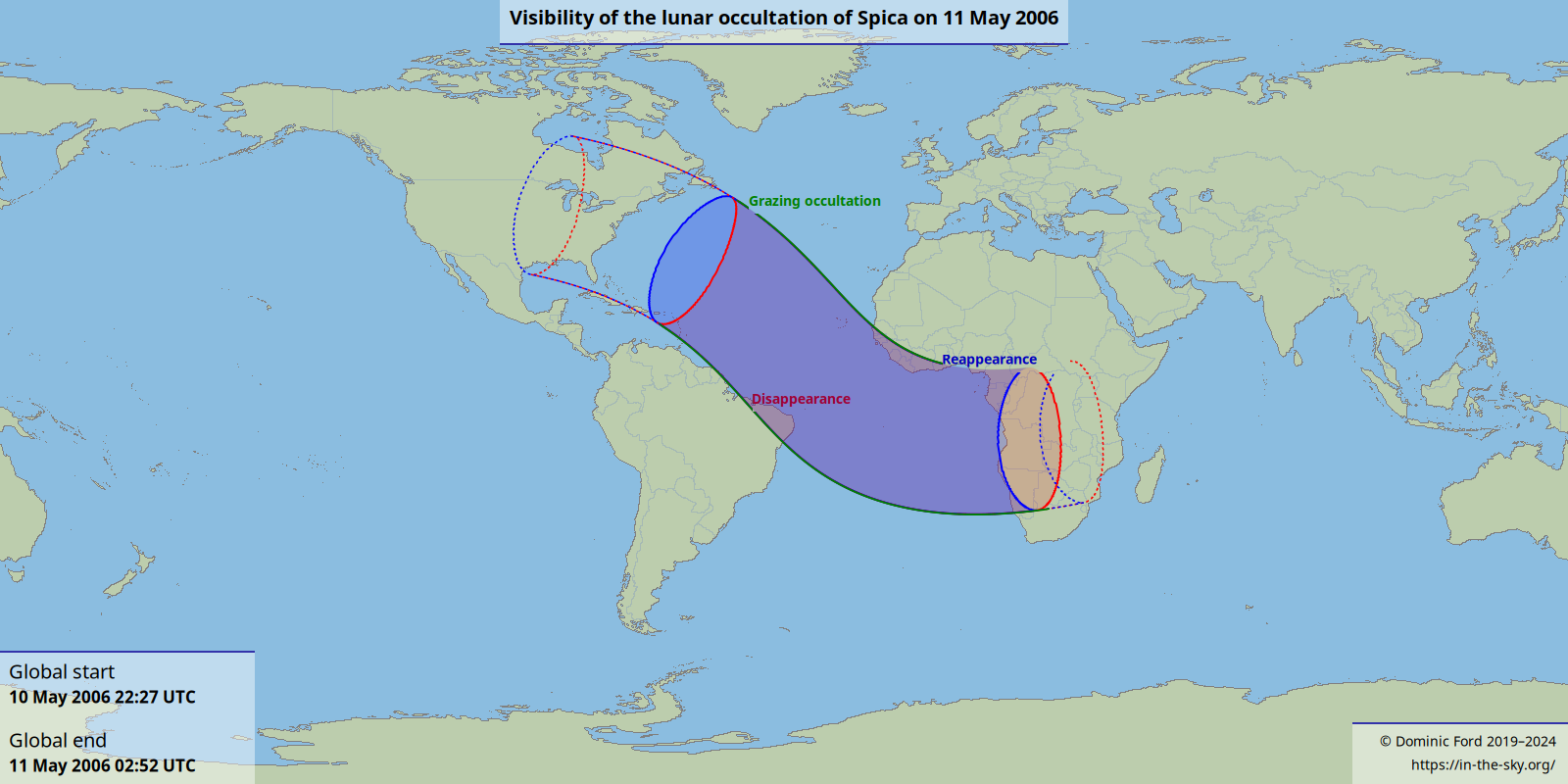The Moon will pass in front of Spica (Alpha Virginis), creating a lunar occultation visible from parts of Sub-Saharan Africa and eastern Brazil. Although the occultation will only be visible across part of the world – because the Moon is so close to the Earth that its position in the sky varies by as much as two degrees across the world – a close conjunction between the pair will be more widely visible.
Unfortunately the occultation will not be visible from South El Monte.
The map below shows the visibility of the occultation across the world. Separate contours show where the disappearance of Spica (Alpha Virginis) is visible (shown in red), and where its reappearance is visible (shown in blue). Solid contours show where each event is likely to be visible through binoculars at a reasonable altitude in the sky. Dotted contours indicate where each event occurs above the horizon, but may not be visible due to the sky being too bright or the Moon being very close to the horizon.

Outside the contours, the Moon will not pass in front of Spica (Alpha Virginis) at any time, or is below the horizon at the time of the occultation. However, a close conjunction between the pair will be visible across much of the world.
The map can be downloaded in PNG , PDF or SVG format. A KMZ file , is also available, which can be opened in Google Earth to provide a higher resolution map.
The animation below shows the path of the occultation across the Earth's globe. The red circle shows where the Moon appears in front of Spica (Alpha Virginis).
A complete list of the countries and territories where the occultation will be visible is as follows:
| Country | Time span (UTC) |
| Democratic Republic of the Congo | 01:40–02:52 |
| Angola | 01:39–02:53 |
| Namibia | 01:46–02:51 |
| Brazil | 23:46–01:33 |
| Botswana | 01:54–02:51 |
| Zambia | 01:50–02:53 |
| Republic of the Congo | 01:39–02:44 |
| Gabon | 01:37–02:41 |
| Cameroon | 01:43–02:30 |
| Ivory Coast | 01:02–01:58 |
| Central African Republic | 01:50–02:28 |
| Guinea | 00:38–01:42 |
| Liberia | 00:50–01:57 |
| Sierra Leone | 00:43–01:43 |
| Ghana | 01:21–01:59 |
| South Africa | 02:06–02:40 |
| Zimbabwe | 01:56–02:50 |
| Senegal | 00:32–01:15 |
| Guinea-Bissau | 00:32–01:22 |
| Nigeria | 01:42–02:09 |
| Equatorial Guinea | 01:40–02:28 |
| French Guiana | 23:44–00:06 |
| Gambia | 00:34–01:09 |
| Cape Verde | 23:53–01:04 |
| Puerto Rico | 22:55–23:36 |
| Guadeloupe | 23:00–23:47 |
| Sao Tome and Principe | 01:34–02:28 |
| Saint Vincent and the Grenadines | 23:15–23:40 |
| Barbados | 23:11–23:48 |
| British Virgin Islands | 22:55–23:40 |
| Martinique | 23:06–23:45 |
| Saint Kitts and Nevis | 22:58–23:44 |
| Saint Lucia | 23:10–23:44 |
| U.S. Virgin Islands | 22:55–23:39 |
| Antigua and Barbuda | 22:56–23:47 |
| Dominica | 23:04–23:45 |
| Saint Helena | 00:50–02:37 |
| Anguilla | 22:55–23:44 |
| Montserrat | 22:59–23:45 |
| Sint Maarten | 22:56–23:44 |
| Saint Barthelemy | 22:56–23:44 |
| Saint Martin | 22:55–23:44 |
| Bonaire, Saint Eustatius and Saba | 22:56–23:43 |
| Grenada | 23:23–23:33 |
Lunar occultations are only ever visible from a small fraction of the Earth's surface. Since the Moon is much closer to the Earth than other celestial objects, its exact position in the sky differs depending on your exact location on Earth due to its large parallax. The position of the Moon as seen from two points on opposite sides of the Earth varies by up to two degrees, or four times the diameter of the full moon.
This means that if the Moon is aligned to pass in front of a particular object for an observer on one side of the Earth, it will appear up to two degrees away from that object on the other side of the Earth.
The position of Spica (Alpha Virginis) at the moment of the occultation will be as follows:
| Object | Right Ascension | Declination | Constellation | Magnitude | Angular Size |
| Spica (Alpha Virginis) | 13h25m10s | 11°09'S | Virgo | 1.1 | 0'00" |
The coordinates above are given in J2000.0.
Next/previous occultations
| « Previous | Next » | |||
| Visible from the Contiguous United States | Worldwide | Worldwide | Visible from the Contiguous United States | |
| 18 Feb 2006 | 13 Apr 2006 | Occultations of Spica (Alpha Virginis) | 07 Jun 2006 | 14 Jul 2024 |
| 18 Feb 2006 | 01 May 2006 | Occultations | 14 May 2006 | 14 Sep 2006 |
The sky on 30 Jan 2026
| The sky on 30 January 2026 | ||||||||||||||||||||||||||||||||||
|
95% 12 days old |
All times shown in PST.
|
|||||||||||||||||||||||||||||||||
Source
The circumstances of this event were computed using the DE430 planetary ephemeris published by the Jet Propulsion Laboratory (JPL).
This event was automatically generated by searching the ephemeris for planetary alignments which are of interest to amateur astronomers, and the text above was generated based on an estimate of your location.
Image credit
The Moon in conjunction with Venus and Jupiter, with the Very Large Telescope in the foreground. Image © Y. Beletsky, ESO, 2009.
